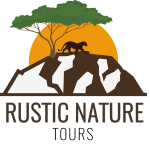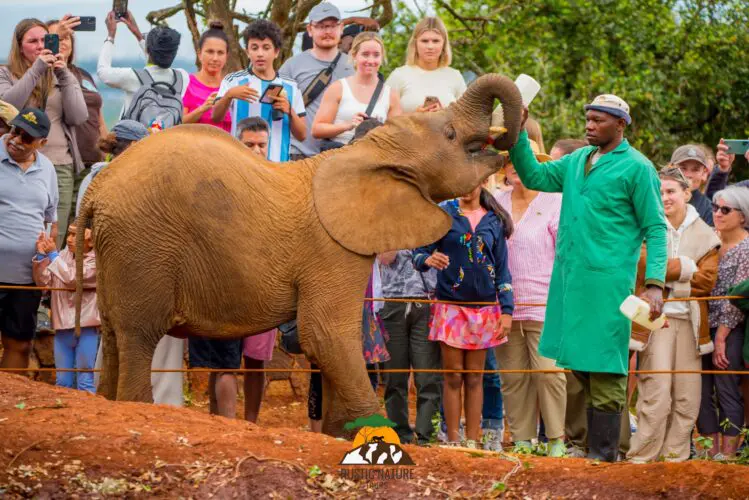The David Sheldrick Elephant Orphanage, located in Nairobi National Park, is a place of hope for orphaned elephants and rhinos. Founded in 1977 by Dr. Dame Daphne Sheldrick in honor of her husband David Sheldrick, a warden of Tsavo East National Park, the orphanage is part of the Sheldrick Wildlife Trust (SWT), an organization committed to wildlife conservation.
With its extensive rescue and rehabilitation programs, the David Sheldrick Elephant Orphanage has successfully rescued over 320 elephants and treated more than 12,000 veterinary cases. This incredible effort not only saves individual animals but also plays a crucial role in wildlife conservation across Africa.
In this blog post, we explore 10 compelling reasons why visiting the David Sheldrick Elephant Orphanage is an unforgettable experience for animal lovers and conservation enthusiasts alike. From witnessing the incredible bond between caregivers and elephants to supporting vital conservation initiatives, discover how this extraordinary place touches hearts and changes lives.
1. A Legacy of Compassion
The story of the David Sheldrick Elephant Orphanage begins with Dr. Dame Daphne Sheldrick, a remarkable individual who dedicated her life to saving orphaned elephants. With an unwavering love for wildlife, Dr. Sheldrick worked tirelessly to rescue and rehabilitate these vulnerable animals. Her kindness and dedication were evident in every aspect of her work, from providing round-the-clock care for young elephants to developing groundbreaking methods for their rehabilitation.
David Sheldrick, as a trailblazing warden of Tsavo East National Park, also played a crucial role in this legacy. His deep understanding of wildlife conservation laid the foundation for the Sheldrick Wildlife Trust (SWT). Together, this dynamic duo established a mission focused on rescuing, rehabilitating, and ultimately reintroducing orphaned elephants into their natural habitats.
“We save elephants not only because they need our help but because we owe it to them as stewards of this planet.” – Dr. Dame Daphne Sheldrick
Through their combined efforts, they have created a safe haven where these magnificent creatures can recover and flourish. The legacy of compassion they left behind continues to inspire and guide the work of the SWT today.
2. Exceptional Rehabilitation Programs
The David Sheldrick Elephant Orphanage has outstanding rehabilitation programs designed to meet the specific needs of each orphaned elephant. This process starts as soon as an elephant calf arrives at the orphanage, usually scared and in urgent need of medical care. Both physical and emotional support are extremely important during this time.
Tailored Rehabilitation Process
Here’s how the rehabilitation process works at the David Sheldrick Elephant Orphanage:
- Initial Assessment: When an elephant arrives, experienced veterinarians conduct a thorough health check to determine what immediate care is required.
- Nutritional Support: Each calf receives a customized diet that meets their age and health requirements.
- Emotional Healing: Caregivers provide constant companionship to help ease the psychological stress caused by losing their family.
Success Stories
The success of these programs can be seen in the stories of individual elephants:
- Murit: This orphan was found on the brink of death, severely dehydrated and suffering from multiple infections. Thanks to dedicated medical treatment and the commitment of his caregivers, Murit made a remarkable recovery and is now a strong young bull ready to be released back into the wild.
- Kenia: After her mother was killed by poachers, Kenia arrived at the orphanage with serious injuries. Through advanced veterinary techniques and continuous care, she has become a leader among her peers.
These stories not only demonstrate the strength of these incredible animals but also highlight how crucial specialized rehabilitation programs are for their survival and successful return to natural habitats.
3. Unique Visitor Experience
The David Sheldrick Elephant Orphanage offers an unparalleled visitor experience that brings you face-to-face with the majestic creatures it strives to protect. Public visits to the orphanage allow guests to witness firsthand the incredible bond between caregivers and their elephant charges.
During these daily public visits, guests have the unique opportunity to observe feeding times, where young elephants are bottle-fed by their dedicated caretakers. This intimate interaction reveals the nurturing environment fostered at the orphanage, highlighting the patience and affection involved in caring for these vulnerable animals.
Watching playful interactions among the elephants is another heartwarming aspect of the visit. The sight of these gentle giants engaging in spontaneous play, splashing in mud baths, or simply resting under the shade of trees leaves an indelible mark on visitors’ hearts.
Visitors often find themselves captivated by:
- The tender moments shared between elephants and their caregivers.
- Feeding sessions that showcase the trust built through consistent care.
- Playful behaviors that reflect the natural instincts and personalities of each elephant.
This immersive experience not only creates unforgettable memories but also supports a noble cause, as entry fees and donations directly contribute to ongoing rescue and rehabilitation efforts.
For those looking to enhance their Kenyan adventure, combining a visit to the David Sheldrick Elephant Orphanage with a 7-day safari adventure through Kenya’s iconic national parks could provide unique wildlife experiences in Masai Mara, Nakuru, Naivasha, and Amboseli. Alternatively, a 4-day Kenyan safari exploring the vast Maasai Mara plains and the flamingo-lined shores of Lake Nakuru or a 5-day safari from Nairobi’s hustle to the wild realms of Samburu could also be memorable additions to your itinerary.
4. Educational Opportunities for All Ages
Education on wildlife conservation at David Sheldrick Elephant Orphanage plays a crucial role in fostering a long-term commitment towards protecting endangered species like elephants. The orphanage offers engaging educational programs that cater to visitors of all ages, instilling a sense of wonder and responsibility.
Key Educational Programs
- Interactive Learning Sessions: Visitors can participate in interactive learning sessions where they discover the intricate lives of elephants, their habitats, and the threats they face.
- Guided Tours: Expert guides provide insightful tours of the facility, sharing stories of individual elephants and explaining the rehabilitation process.
- Workshops and Seminars: Periodic workshops and seminars delve into conservation topics, offering deeper understanding and practical ways to contribute to wildlife protection.
Community Outreach Programs
The Sheldrick Wildlife Trust extends its educational initiatives beyond the orphanage through community outreach programs. These programs aim to:
- Engage Local Communities: Educate local communities about the importance of wildlife conservation and sustainable practices.
- School Visits: Organize visits to local schools to inspire young minds and nurture future conservationists.
- Public Awareness Campaigns: Run campaigns to raise awareness about poaching, habitat destruction, and other critical issues affecting wildlife.
By offering these educational opportunities, the David Sheldrick Elephant Orphanage cultivates a generation of informed advocates dedicated to preserving our planet’s biodiversity.
5. Support Ongoing Rescue Efforts Through Donations
Donations to the David Sheldrick Elephant Orphanage are crucial for its mission to save and rehabilitate orphaned elephants. Visitor contributions directly fund rescue operations, providing the resources needed for emergency responses, advanced veterinary care, and daily sustenance for the elephants.
Key Areas Supported by Donations:
- Rescue Operations: Essential funding enables rapid response teams to reach and rescue orphaned or injured elephants from dire situations.
- Veterinary Care: Advanced medical treatments and round-the-clock care ensure that each elephant receives the best possible chance at recovery.
- Daily Needs: From milk formulas to nutritious supplements, donations cover the costs of feeding and nurturing these gentle giants.
Transparency in Fund Allocation:
The Sheldrick Wildlife Trust (SWT) takes pride in its transparent allocation of funds. Supporters can easily track how their donations impact individual animals’ lives through:
- Detailed Reports: Regular updates on rescued elephants’ progress, health status, and milestones achieved.
- Public Financial Records: Open access to financial statements ensures accountability and builds trust with donors.
Every contribution makes a tangible difference, allowing the orphanage to continue its vital work and secure a future for these magnificent creatures. Supporting initiatives for wildlife conservation through donations not only helps the resident elephants but also fortifies broader efforts to protect Kenya’s rich biodiversity.
6. Anti-Poaching Initiatives: Protecting Elephants from Harmful Threats
The David Sheldrick Elephant Orphanage, under the Sheldrick Wildlife Trust (SWT), is leading the fight against poaching. These efforts are vital in protecting elephants from poachers who endanger their existence.
Proactive Measures Against Poaching
SWT employs a comprehensive strategy to tackle poaching:
- Aerial Surveillance: Using aircraft to monitor large elephant habitats, providing immediate information on potential threats.
- Rapid Response Teams: Quickly responding to poaching incidents with well-trained rangers ready to handle emergencies.
- Canine Units: Using sniffer dogs to find illegal wildlife products and discourage poachers.
Collaborations for Sustainable Solutions
Partnerships are crucial in enhancing the effectiveness of these anti-poaching actions:
- Local Authorities: Collaborating closely with government agencies ensures legal support and enforcement against poaching activities.
- Community Engagement: Involving local communities in conservation efforts fosters a sense of ownership and responsibility toward protecting wildlife. Educational programs and job opportunities in conservation further strengthen this connection.
These initiatives demonstrate SWT’s commitment to creating a secure environment where elephants can flourish, free from human-induced threats. The David Sheldrick Elephant Orphanage serves as a model for how combined efforts and strategic partnerships can significantly impact wildlife conservation.
7. Habitat Preservation Efforts: Safeguarding Elephants’ Natural Homes
Habitat preservation projects supported by David Sheldrick Elephant Orphanage play a crucial role in ensuring the long-term survival of elephants. These initiatives are essential for maintaining the delicate balance of ecosystems and providing safe havens for these majestic creatures.
Reforestation Programs
Restoring degraded forest areas is critical. The orphanage supports planting native tree species, which not only provide food and shelter for elephants but also combat soil erosion and promote biodiversity.
Wetland Rehabilitation Projects
Wetlands serve as vital water sources and habitats for a myriad of species. By rehabilitating these areas, the orphanage ensures that elephants have access to necessary resources while supporting overall ecosystem health.
Collaboration with government agencies is another cornerstone of these efforts. Establishing protected areas through partnerships ensures that elephants can roam freely without human interference. These sanctuaries offer a refuge where elephants can live as they would in the wild, away from the threats posed by habitat destruction and human encroachment.
Such combined efforts underscore the commitment to safeguarding elephants’ natural homes, reflecting a holistic approach to conservation that benefits both wildlife and surrounding communities.
8. Global Recognition as a Leader in Conservation Advocacy
The David Sheldrick Elephant Orphanage has earned numerous awards for its unwavering commitment to elephant conservation. These accolades underscore the organization’s influence and effectiveness in raising global awareness about the plight of these majestic creatures.
Notable Accolades
- UNESCO Kalinga Prize for the Popularization of Science: Highlighting Dr. Dame Daphne Sheldrick’s extraordinary efforts in wildlife conservation and education.
- BBC Lifetime Achievement Award: Recognizing a lifetime dedicated to the preservation of elephants and other wildlife.
- Honorary Doctorate from Glasgow University: Awarded to Dr. Sheldrick for her pioneering work in animal husbandry and conservation.
Impact on Global Conservation Efforts
- These prestigious awards validate the orphanage’s role as a beacon of hope and action within the global conservation community.
- The recognition has mobilized international support, inspiring individuals, organizations, and governments to take collective action towards protecting our planet’s biodiversity.
Influence on Public Perception and Policy
- The accolades have not only brought attention to the orphanage but have also shed light on broader conservation issues, prompting policy changes and increased funding for wildlife protection efforts.
- By showcasing success stories and impactful initiatives, these awards encourage other conservationists to adopt similar strategies, amplifying the orphanage’s mission on a global scale.
Through its celebrated achievements, the David Sheldrick Elephant Orphanage continues to inspire a worldwide movement dedicated to safeguarding endangered species and preserving natural habitats.
9. Personal Connection with Elephants: An Unforgettable Experience at David Sheldrick Elephant Orphanage
The emotional connection fostered during visits to the David Sheldrick Elephant Orphanage creates lasting impressions on visitors. Many individuals recount heartwarming stories of watching orphaned elephants, who have faced unimaginable hardships, thrive against all odds.
1. Witnessing Resilience
Visitors often share how seeing these gentle giants resume playful behaviors and form bonds with their caretakers deeply moved them. The sight of an elephant calf gently nuzzling its caregiver or playfully interacting with other orphans can stir profound emotions.
2. Empathy in Action
Such encounters transform perspectives. Guests who might have been indifferent to wildlife issues find themselves suddenly invested in the plight of these magnificent creatures. They leave with a heightened sense of empathy and a personal commitment to supporting conservation efforts.
One visitor shared:
“The moment I saw a tiny elephant, once lost and scared, now thriving and trusting again, I felt an overwhelming sense of hope and responsibility. It was a life-changing experience.”
This emotional connection is not just about witnessing; it’s about feeling part of a larger cause. The David Sheldrick Elephant Orphanage offers more than a visit—it offers an invitation to be part of something greater, fostering a lifelong bond between humans and elephants.
To fully appreciate the beauty of these majestic creatures and the landscapes they inhabit, consider extending your visit to include a Kenya safari. Such an experience could involve a 7-day journey through the wildlife-rich Maasai Mara or the serene Lake Naivasha, or perhaps a 5-day adventure exploring Hell’s Gate and Lake Nakuru. For those seeking exclusive encounters with nature’s creatures, a private wildlife safari could provide personalized itineraries and intimate moments that further deepen your connection with wildlife.
10. A Call to Action: Continuing Support Beyond Your Visit to David Sheldrick Elephant Orphanage
Ways to contribute towards wildlife preservation after visiting David Sheldrick Elephant Orphanage extend beyond the gates of the sanctuary. There are numerous strategies you can adopt to make a lasting impact:
- Community Engagement: Initiate local conservation projects or participate in awareness campaigns. Organize community clean-up drives, tree planting events, or educational workshops that emphasize the importance of wildlife preservation.
- Online Advocacy: Harness the power of social media to spread the word about SWT’s mission. Share your experiences and highlight success stories using relevant hashtags. Create content that raises awareness and drives traffic to SWT’s official channels.
- Fundraising Events: Host events such as charity runs, bake sales, or art auctions with proceeds going towards SWT. Collaborate with local businesses to sponsor these events, amplifying their reach and impact.
- Monthly Donations: Commit to regular financial support through SWT’s adoption programs or monthly giving options. Even small contributions can collectively provide significant resources for ongoing rescue and rehabilitation efforts.
Each small action contributes towards protecting endangered species from extinction. By integrating these practices into your daily life, you help sustain the legacy of compassion and conservation championed by David Sheldrick Elephant Orphanage.
Conclusion: Visit the David Sheldrick Elephant Orphanage Today!
Your journey to the heart of conservation begins with a visit to the David Sheldrick Elephant Orphanage. Witnessing the incredible work being done to save these majestic creatures offers not just an unforgettable experience but also a chance to contribute to a noble cause. Book your ticket now and become part of a legacy dedicated to wildlife preservation. Every visit, every donation, makes a difference in ensuring these elephants thrive against all odds.
Your adventure awaits—immerse yourself in compassion and conservation today!
FAQs (Frequently Asked Questions)
What is the David Sheldrick Elephant Orphanage?
The David Sheldrick Elephant Orphanage is a wildlife conservation organization dedicated to rescuing, rehabilitating, and releasing orphaned elephants back into the wild. Founded by Dr. Dame Daphne Sheldrick, it plays a significant role in wildlife conservation efforts and aims to educate the public about the importance of protecting endangered species.
How can I support the David Sheldrick Elephant Orphanage?
Visitors can support the David Sheldrick Elephant Orphanage through donations, which are crucial for funding rescue operations and ensuring the well-being of resident elephants. The organization maintains transparency in fund allocation practices, allowing supporters to track how their contributions impact individual animals’ lives.
What kind of visitor experiences does the orphanage offer?
The David Sheldrick Elephant Orphanage offers unique visitor experiences where guests can witness the bond between caregivers and elephants during daily public visits. Visitors have the opportunity to observe feeding sessions and playful interactions with the elephants, creating unforgettable memories while supporting a noble cause.
Are there educational programs available at the orphanage?
Yes, the David Sheldrick Elephant Orphanage provides engaging educational programs that cater to visitors of all ages. These programs emphasize the importance of wildlife conservation and foster a long-term commitment to protecting endangered species like elephants.
What initiatives does the orphanage have to combat poaching?
The David Sheldrick Elephant Orphanage leads proactive anti-poaching initiatives aimed at protecting elephants from harmful threats. This includes collaborations with local authorities and communities to create sustainable solutions that benefit both wildlife and people.
How can I contribute to wildlife preservation after my visit?
After visiting the David Sheldrick Elephant Orphanage, individuals can continue to contribute to wildlife preservation by adopting long-term strategies within their communities or participating in online platforms such as social media campaigns or fundraising events organized on behalf of SWT. Every small action counts in protecting endangered species from extinction.




